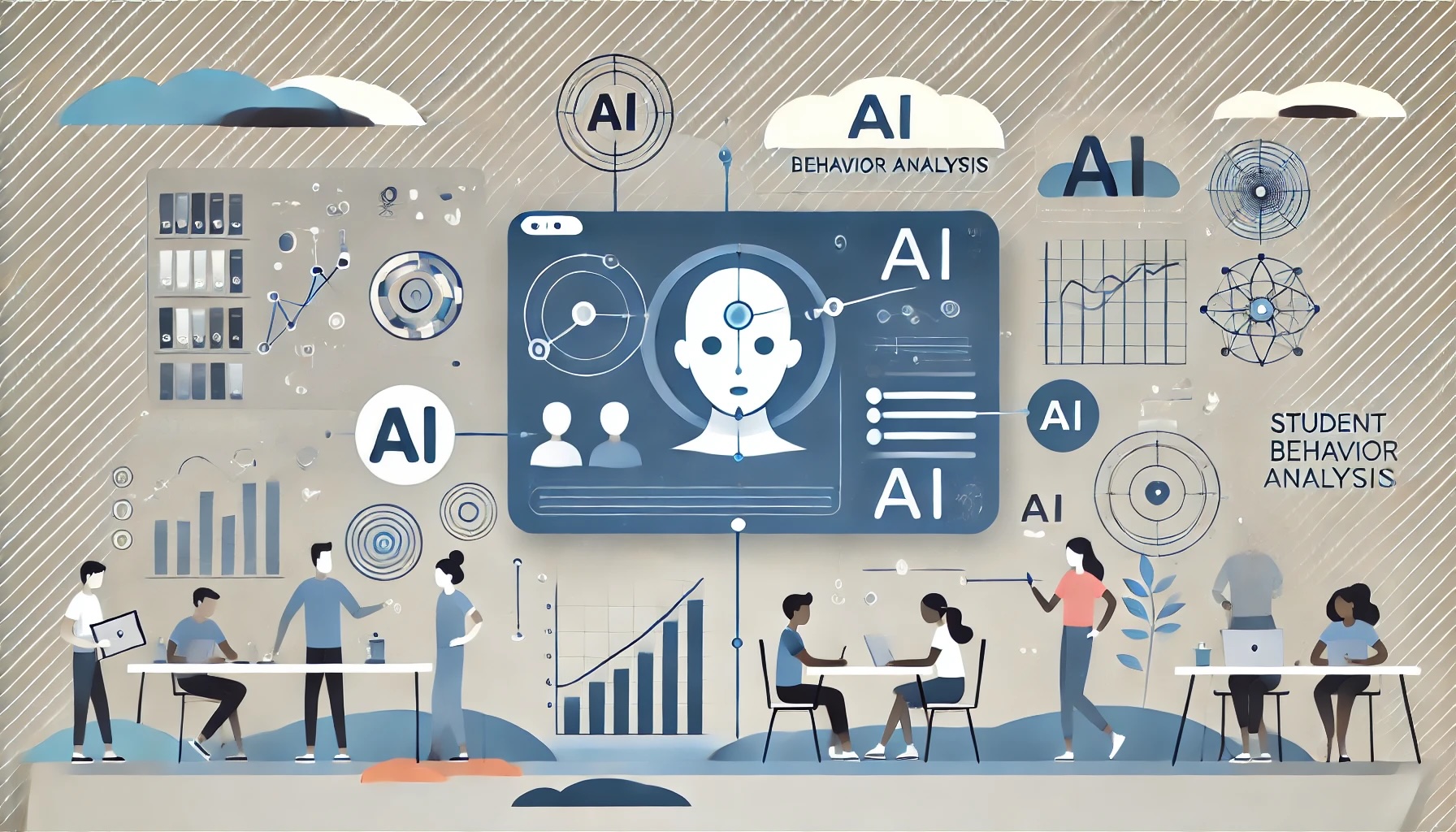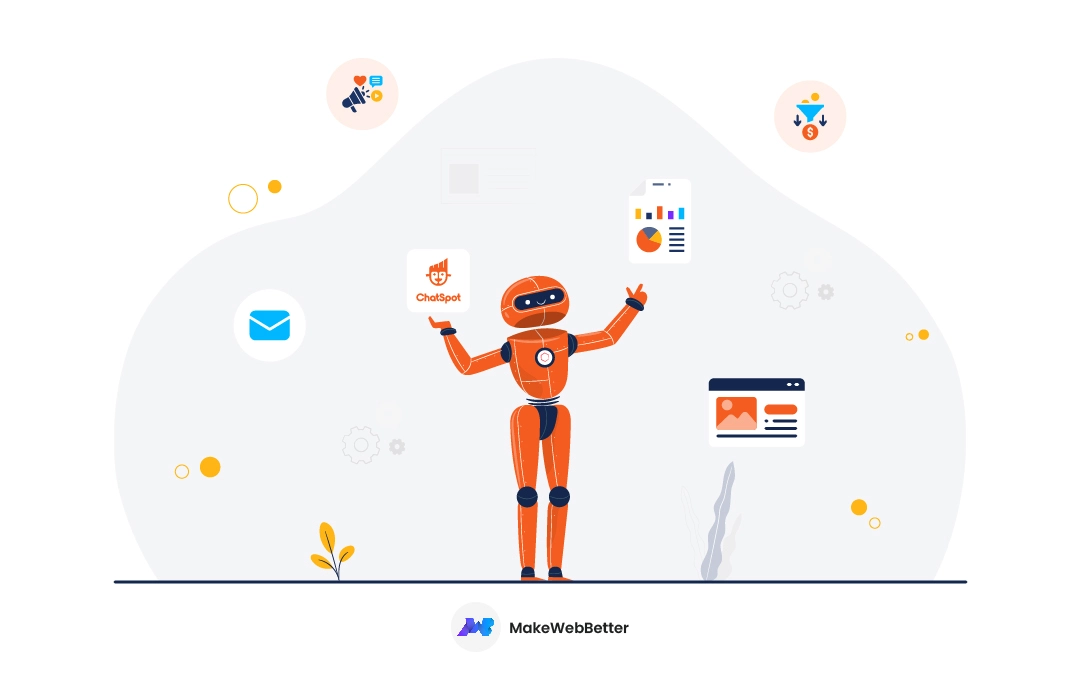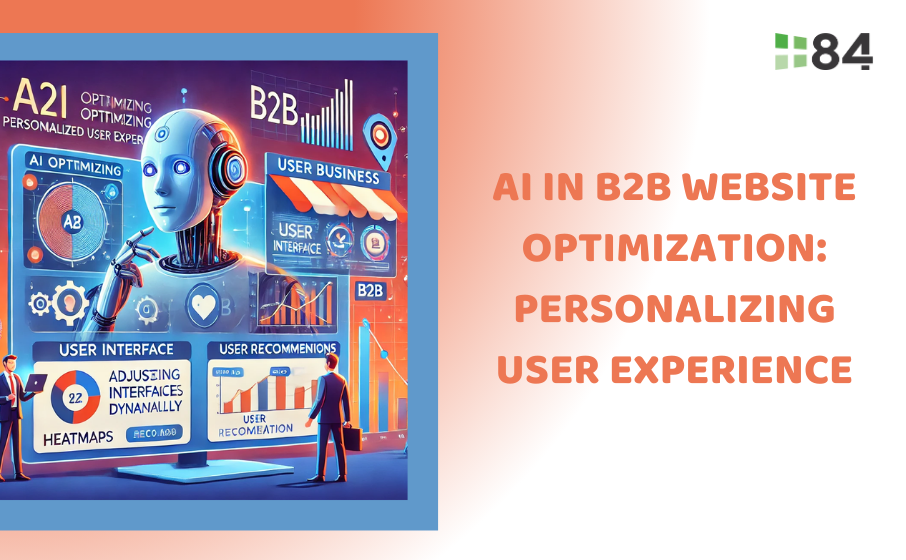In the increasingly competitive landscape of online business, user experience (UX) on a website is no longer just a supporting factor—it has become a decisive element in a company’s success. A well-designed website not only retains visitors but also plays a crucial role in driving conversion rates. This is especially important for B2B businesses, where the decision-making process is often lengthy and complex. When a website can accurately meet the needs of each visitor, businesses gain a significant competitive advantage.
In this context, artificial intelligence (AI) is revolutionizing how businesses optimize their websites. This technology not only enables precise analysis of user behavior but also allows for personalized content, improved interfaces, and enhanced conversion rates. With these advantages, AI is becoming an indispensable tool for B2B enterprises looking to enhance user experience and maximize online performance. In this article, we will explore how AI can help B2B companies achieve these goals.
Analyzing User Behavior with AI
One of the key factors in optimizing a B2B website is understanding visitor behavior. When businesses can grasp how users interact with their site, they can adjust content, layout, and overall experience to better align with actual needs.
AI plays a critical role in collecting and analyzing real-time user behavior data. Leveraging technologies such as machine learning (ML) and natural language processing (NLP), AI can identify behavior patterns, analyze trends, and provide recommendations to improve website performance. This enables businesses not only to understand their customers better but also to proactively adjust strategies to increase conversion rates.

Benefits of AI-Powered Behavior Analysis
🔹 Better Customer Understanding – AI helps businesses track key metrics such as which pages attract the most attention, how long users stay on each page, and where they drop off. This insight allows businesses to identify which content or sections need improvement to keep visitors engaged longer.
🔹 Trend Prediction – Based on collected data, AI can analyze and predict customer behavior trends. For instance, if AI detects that a group of visitors frequently engages with specific content, businesses can create more related material to maximize engagement.
🔹 Optimizing the Customer Journey – By understanding user behavior, businesses can adjust website layout and content to create a smoother experience. AI can suggest modifications such as repositioning call-to-action (CTA) buttons, guiding users to relevant content, or even personalizing the interface based on individual visitor profiles.
For example, AI might detect that a significant number of users abandon the site at the contact form stage. This could be due to the form being too lengthy or requiring excessive information. Identifying this issue, businesses can optimize the form by reducing required fields, offering auto-fill suggestions, or integrating an AI chatbot to assist users in completing the form. These adjustments can help reduce drop-off rates and increase the likelihood of users completing desired actions.
Thanks to its deep data analysis capabilities and accurate trend predictions, AI is becoming an essential tool in B2B website optimization, helping businesses enhance user experience and maximize site performance.
AI-Powered Content Personalization: Creating Unique Experiences for Every Visitor
In an increasingly competitive digital environment, delivering relevant content to each visitor not only improves their experience but also increases conversion opportunities. One of the most powerful applications of AI in B2B website optimization is its ability to personalize content for each user.
Rather than displaying the same content to all visitors, AI can analyze user behavior, preferences, and interaction history to deliver a tailored experience. This allows businesses to engage with customers more precisely, making them feel valued and helping them quickly find the information they need.
How AI Personalizes Content
Smart Content Recommendations
AI can track user behavior on the website to suggest relevant content. For example, if a visitor frequently reads articles about “smart exporting,” the AI system can automatically display more related content upon their return, allowing them to access useful information quickly.
Homepage Optimization for Each Visitor
Different visitors have different needs and interests, so displaying relevant content right on the homepage can significantly boost engagement. AI can recognize returning users based on previous interactions and automatically showcase products, services, or content that best suit their needs.
Personalized Email Marketing
AI goes beyond website content personalization; it can also be applied to email marketing strategies. By analyzing users’ browsing history and interactions, AI can automatically generate marketing emails with personalized content. For instance, if a visitor viewed a product but did not make a purchase, AI can send a reminder email with an appropriate offer to encourage conversion.
Benefits of AI-Driven Content Personalization
Applying AI to content personalization brings several key benefits for B2B businesses. Not only does it enhance user experience, but it also increases conversion rates, maintains customer engagement, and builds brand loyalty. When visitors receive content that truly aligns with their needs, they are more likely to return to the website and complete a purchase.
Enhancing Website Design and Functionality with AI Tools
Beyond analyzing user behavior and personalizing content, AI also plays a crucial role in optimizing website design and functionality. An intuitive, user-friendly interface not only improves user experience but also contributes to higher conversion rates. With AI’s assistance, B2B businesses can intelligently refine and optimize their websites based on real data rather than intuition.
AI-Powered Tools for Website Optimization
- AI Chatbots: Integrating intelligent chatbots enables businesses to provide 24/7 customer support, answer inquiries instantly, and guide users in finding information quickly. This is particularly valuable for B2B companies, where customers often require detailed information before making a purchase decision.
- AI-Based Layout Optimization: Certain AI tools can analyze user browsing behavior to suggest the most effective content, image, and button placements. This allows businesses to optimize the website’s layout scientifically rather than relying solely on intuition.
- Automated A/B Testing: AI can conduct automatic A/B testing to compare the effectiveness of different website versions. Based on real-time data, AI recommends the optimal version for businesses to implement, improving conversion rates without the need for time-consuming manual testing.
Case Study: HubSpot – Optimizing Website Design with AI to Increase Conversion Rates
HubSpot, one of the leading platforms in CRM and marketing automation, continuously seeks ways to optimize its website to deliver the best user experience. As a B2B company offering complex products and services, it needed an intelligent approach to help customers easily find relevant information and take action quickly.

Challenges Before AI Implementation:
- Many visitors browsed the site but left without signing up for a trial.
- The “Get Started” button had a lower-than-expected click-through rate.
- Users spent too much time searching for the right resources.
AI-Driven Solutions:
✅ AI-Powered Chatbot for 24/7 Support
- HubSpot integrated an intelligent AI chatbot to help visitors find relevant content without navigating through multiple pages.
- The chatbot identified frequently asked questions and suggested appropriate resources, reducing the need for human customer support.
- Results: Increased chatbot engagement by 35% and reduced customer support emails by 20%.
✅ AI-Based Layout Optimization
- AI analyzed user behavior to recommend the best content arrangement for an intuitive browsing experience.
- HubSpot repositioned its CTA buttons based on AI analysis, placing the “Get Started” button in high-visibility areas.
- Results: CTA click-through rates increased by 27%, and visitors spent 15% more time on the site.
✅ AI-Driven Automated A/B Testing
- AI continuously ran A/B tests on different interface versions, tracking real-time data to recommend the most effective design.
- For example, when AI detected low engagement with the “Request a Demo” button, HubSpot tested different colors and placements to optimize performance.
- Results: Demo request submissions increased by 20% after implementing the AI-recommended version.
By leveraging AI for website optimization, HubSpot significantly improved user experience and boosted conversion rates. These enhancements not only made information more accessible but also streamlined the journey from website visitors to potential customers.
Optimizing Customer Conversion with AI
Conversion optimization is not just a goal but a decisive factor in the success of any website. For B2B businesses, where the buying process is often lengthy and involves multiple stages, optimizing the customer journey is essential to increasing conversion rates. AI plays a crucial role in enhancing user experience, personalizing interactions, and automating processes, helping businesses maximize their online performance.
Below are some ways AI can support conversion optimization on B2B websites:
1. Analyzing and Predicting Customer Needs
AI can collect and analyze customer behavior data to predict which products or services they are interested in. By identifying shopping trends and segmenting potential customers, businesses can develop more effective engagement strategies, increasing the likelihood of converting visitors into actual customers.
2. Automating the Sales Process
AI enables businesses to automate various stages of the sales process, such as sending reminder emails to customers to complete their purchases or suggesting relevant products/services based on their interaction history. This helps maintain customer engagement, reduce drop-off rates, and encourage them to move forward in their buying journey.
3. Real-Time Pricing Optimization
AI can analyze market data and evaluate user behavior to recommend optimal pricing strategies. For instance, if AI detects that customers tend to wait for promotions before making a purchase, the system can automatically adjust prices or provide personalized offers to encourage faster decision-making.
For example, if AI finds that a specific customer segment is more likely to complete a purchase after receiving a discount code, businesses can use this insight to automatically send personalized promotions to that group, thereby increasing transaction completion rates.
With its powerful data analysis and flexible automation capabilities, AI helps B2B businesses not only improve conversion rates but also enhance customer experience, creating a sustainable competitive advantage in the digital landscape.
Challenges and Considerations When Implementing AI on B2B Websites
While AI offers numerous benefits for optimizing B2B websites, businesses must consider several critical challenges before implementation. AI adoption requires technological investment and involves concerns about security, costs, and data accuracy.
1. Data Privacy and Security
AI relies on collecting and analyzing large amounts of user data, including browsing behavior, personal information, and transaction history. This raises significant concerns about privacy and data security. Without proper data protection measures, businesses risk data breaches, loss of customer trust, and potential violations of privacy regulations, such as GDPR or Vietnam’s Decree 13/2023 on personal data protection. Therefore, before implementing AI, businesses must establish stringent security policies and ensure compliance with legal requirements.
2. Implementation Costs
Although AI automates many processes and enhances customer experience, deploying AI solutions requires a substantial investment. Businesses need to allocate funds for technology infrastructure, AI software, personnel, and system maintenance. For small and medium-sized enterprises (SMEs), this can be a significant barrier. However, instead of investing in complex AI solutions immediately, businesses can start with existing AI-powered tools, such as AI chatbots or content personalization systems, to test effectiveness before scaling up.
3. AI Accuracy and Data Quality
AI operates based on input data, and if the data is inaccurate or incomplete, AI algorithms may generate misleading predictions, negatively impacting user experience and business performance. For instance, if customer data is outdated or contains errors, AI might suggest irrelevant content or products, leading to lower conversion rates. To mitigate this issue, businesses must establish robust data collection, processing, and cleaning procedures to ensure continuous accuracy and updates.
Conclusion
In an increasingly competitive digital marketplace, website optimization goes beyond attractive design and engaging content—it must also deliver personalized experiences for each customer. AI is driving a revolution in this space, enabling B2B businesses to better understand user behavior, dynamically adjust content, and optimize the customer journey to boost conversion rates.
From in-depth data analysis and audience-specific content personalization to UI/UX improvements and automated sales processes, AI provides practical solutions that help businesses operate more efficiently and maintain a competitive edge. Not only does AI optimize website performance, but it also enhances customer experience, fostering deeper connections between businesses and potential clients.


